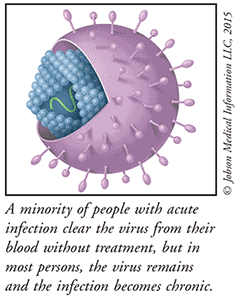US Pharm. 2015;40(10):17-18.
Viral Infection That Attacks the Liver
Hepatitis C is caused by a virus that infects the liver. Unlike most viruses, it is spread only through contact with infected blood. Most people infected with the hepatitis C virus do not have symptoms for many years, so they are unaware of their condition. There are several drugs for treating hepatitis C that are very effective, and new treatments cause fewer side effects than older drug regimens. It is very important to be tested for hepatitis C infection, since the virus causes serious liver damage if it is not treated.
Symptoms May Not Develop for Many Years
Hepatitis C affects more that 3 million people in the United States and causes thousands of deaths each year from liver-related diseases. This infection increases a person’s risk of developing cirrhosis (scarring) of the liver and liver cancer.
Acute Versus Chronic Infection
An acute hepatitis C infection occurs within the first 6 months after a person is exposed to the virus. Symptoms, which can appear weeks or months after infection, may include nausea, vomiting, loss of appetite, diarrhea, fever, headache, and abdominal pain. Up to 25% of people with an acute infection clear the virus from their blood without treatment. In most people, however, the virus remains in the bloodstream and the infection becomes chronic. A chronic hepatitis C infection causes liver damage and inflammation. Healthy liver tissue dies and is replaced by scar tissue. Left untreated, hepatitis C infection can lead to permanent liver failure, making liver transplantation necessary.

Who Is at Risk?
Hepatitis C virus is not spread by casual contact, such as shaking hands or hugging. The risk is higher in people who have used contaminated needles with injectable drugs or have gotten tattoos with contaminated tools. Babies born to infected mothers are also at high risk. Healthcare workers may become infected through an accidental needle stick. Using an infected person’s razor blade or toothbrush is another method of transmission. People with HIV, men who have sex with men, and anyone who has unprotected sex with an infected person are also at increased risk for hepatitis C infection.
People with a high risk of hepatitis C infection should be tested routinely. Blood testing is done initially, and a liver biopsy may be recommended if a blood test is positive. Even without other risk factors, people born between 1945 and 1965 should receive a one-time blood test, since 75% of all persons with chronic hepatitis C were born during this time period. Many people in this age group are unaware that they are infected. Test results allow doctors to plan treatment to clear the virus and avoid liver damage. In the case of acute infection or if liver damage is mild, treatment may be delayed while the virus and liver function are monitored.
Treatment and Monitoring
In most cases, hepatitis C infection is treated when it becomes chronic. Several drugs work to either boost the immune system or target the virus. There are six genotypes of hepatitis C virus, and the genotype determines which drug treatment will be successful. Therapy with two or three drugs can completely clear the virus from the blood, which is considered a cure. The standard treatment has been weekly peginterferon injections and oral ribavirin, resulting in a 40% cure rate. Side effects from this regimen are a problem for many patients. Newer antiviral drugs that are specific for hepatitis C may be added, which could increase the cure rate to 90%. Treatment continues for 6 to 12 months. If the virus remains absent 6 months after treatment has ended, the infection is considered cured.
Blood tests are performed regularly to monitor treatment progress and detect potential liver cancer. People with chronic hepatitis C infection should eat a healthful diet, avoid alcohol, and take their medicine as prescribed.
No vaccine is available for preventing hepatitis C infection. The best prevention is to avoid behaviors that increase the risk of infection.
To comment on this article, contact rdavidson@uspharmacist.com.





